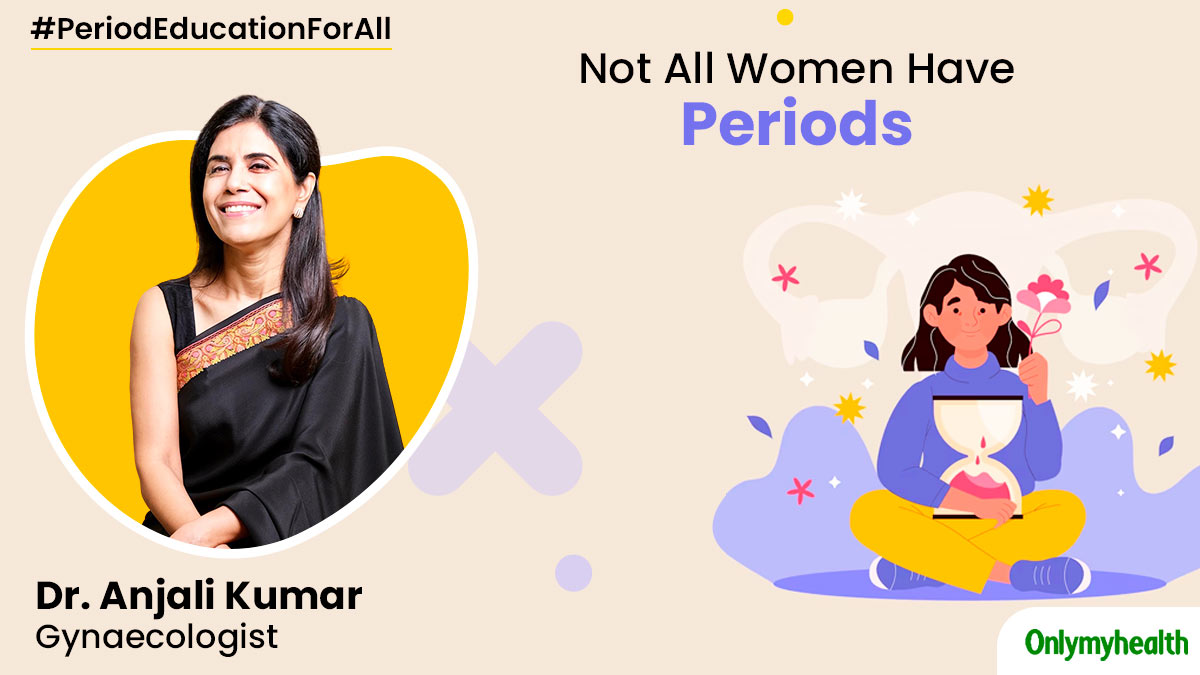
Did you know not all people who menstruate are women? Did you also know that not all women menstruate? If you aren’t aware, then don't worry because you aren’t alone. As bizarre as it may sound, it is true that not all women have their monthly periods. This condition is called Amenorrhea.
Table of Content:-
This Menstrual Hygiene Week, in an attempt to provide #PeriodEducationForAll, we at Only My Health spoke with Dr Anjali Kumar (Maitriwoman for Instagrammers), Director-Obstetrics and Gynaecology, CK Birla Hospital, Gurugram, to throw light on this rare but concerning condition called amenorrhea.
Also Read: #PeriodEducationForAll: Gynaecologist Anjali Kumar On Why Period Talk Is Also Necessary For Men
What Is Amenorrhea?
.jpg)
Dr Kumar said, “Amenorrhea is the absence of periods.” According to the gynaecologist, there are two types of amenorrhea: Primary and Secondary Amenorrhea.
Primary Amenorrhea
Primary amenorrhea is when the periods never happen, right from the beginning. “This could occur due to some abnormalities in the uterus or because of some genetic abnormalities. So if by 16 years of age, a girl has not had a period, it is important to seek medical help. In case by 14 years of age, there are no other changes, like secondary sexual characteristics like breast development, growth of pubic or axillary hair, then also it is important to seek the help of a doctor,” Dr Kumar recommended.
Secondary Amenorrhea
In secondary amenorrhea, the periods occur but stop after a while or after many years. According to Dr Kumar, this could be caused by several reasons including:
- Hormonal changes
- Polycystic Ovarian Disease (PCOD)
- Thyroid
- Premature Menopause
- Endometrium damage
- Surgeries
- Infections
- Tuberculosis
“Not having a period is never normal and one must meet a gynaecologist as soon as possible to find out the cause as treatment can be initiated after the cause has been determined,” the doctor added.
Can Lifestyle Factors Contribute To Amenorrhea?
.jpg)
Hormonal imbalances can lead to secondary amenorrhea, according to Dr Kumar. Conditions like thyroid, PCOD, high prolactin levels, and obesity can contribute to a missed or absent period.
“People who are on a high Body Mass Index (BMI) side, they may miss their period. People who are very very thin, they may also miss their period. Women who have eating disorders like anorexia nervosa or bulimia, can also experience amenorrhea. People who are into high performance sports, they can also miss their periods because all these activities can disturb the hormonal atmosphere at the level of the brain,” the doctor elaborated.
However, she also mentions that women who do not exercise at all and are obese, can also have disturbed periods. Furthermore, those who are on certain drugs, such as antipsychotic medications can also miss their periods.
Also Read: #PeriodEducationForAll: Dr Anjali Kumar Explains The Four Phases Of Menstrual Cycle
‘Amenorrhea Is Treatable’
Dr Kumar says amenorrhea is absolutely treatable. The first step she recommends is to check for pregnancy, which is one of the biggest reasons behind a missed period. Once that has been ruled out, the doctor said, “In case it is primary amenorrhea, which means by 16 a girl has not got her period, a doctor must be consulted as soon as possible.”
Treatment of amenorrhea depends on the underlying cause of the condition. In case of pregnancy, lactation or menopause, one may not require any treatment. If that's not the case, the treatments may include following a proper diet and exercise regime, managing stress levels, and working towards balancing your hormones.
How we keep this article up to date:
We work with experts and keep a close eye on the latest in health and wellness. Whenever there is a new research or helpful information, we update our articles with accurate and useful advice.
Current Version
